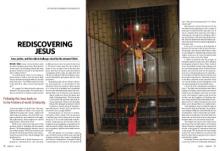Love, justice, and the radical challenge raised by the untamed Christ.
Feature

In the world's newest country, South Sudan, seminaries have taken on an unusual subject.

Mark's gospel tells us that healing, like suffering, should unite us. A Bible study for the health-care debate.

The KKK bomb that killed four girls did not have the last word. An eyewitness account.

The secretive, elitist Capitol Hill organization has cozied up to the despots -- and, in my case, done genuine good.

A little Methodist church has a big heart for the left out and the lonley in the shadow of the nation's capital.
Too often we try to make scripture fit our own agenda, rather than the other way around.
Benedictine women in Wisconsin are practicing new (and ancient) ways to save the earth, starting with the home front.
Peace in Israel/Palestine will, more and more, revolve around struggles to control water, God's unownable gift.
It's time to reform our tax system-- to quit rewarding obscene wealth, Wall Street gambling, and corporate polluters.
The median wealth of African-American women is 400 times less than their white counterparts. Policy expert Maya Rockeymoore tells us why that is, and what can be done.

When those who feel accursed come to our door, are we ready with something holy?

Servant leadership is a paradoxical concept that is as old as Lao Tzu and Jesus and as new as Dorothy Day and Desmond Tutu. In a world desperately in need of new leaders and fresh models of leadership, now is a good time to examine the myths and paradoxes of what Christians mean by "servant leadership."
The key to unleashing transformative social change is developing leaders who will transform systems. Leaders transform themselves, people around them, organizations they lead, and, ultimately, communities they serve. Servant leaders foster servant churches, which become change agents for their neighborhoods and beyond.
Servant leadership may seem paradoxical to some, but that is precisely what we would expect from a leadership style modeled by Jesus. When management educator Robert Greenleaf coined the phrase in the 1970s, he intentionally selected a paradoxical term because it epitomized the paradoxical nature of the teachings and example of Jesus, who used parables to teach wisdom and who demonstrated the ultimate irony with his life and resurrection. Unfortunately, some self-proclaimed proponents of servant leadership now are equating it with everything from visionary leadership to effective time management.
Servant leaders are motivated first to serve and then to lead. The servant leader wants to serve rather than be served (Mark 10:45). The servant leader is more interested in giving than receiving (Matthew 5:40-42). The servant leader is a steward who wants to give back to God, family, and community.
Non-servant leaders, on the other hand, or "pedestal leaders," tend to command people and control what they do. These leaders have little interest in listening to the needs, interests, or ideas of others. They might call themselves "public servants," but they act as if they are interested in serving only themselves. They lack the humility to understand that leaders need people as much as people need leaders.

He was in the army. Then he realized that, as a Christian, he couldn't kill. An Iraq vet grapples with conscience and war.





